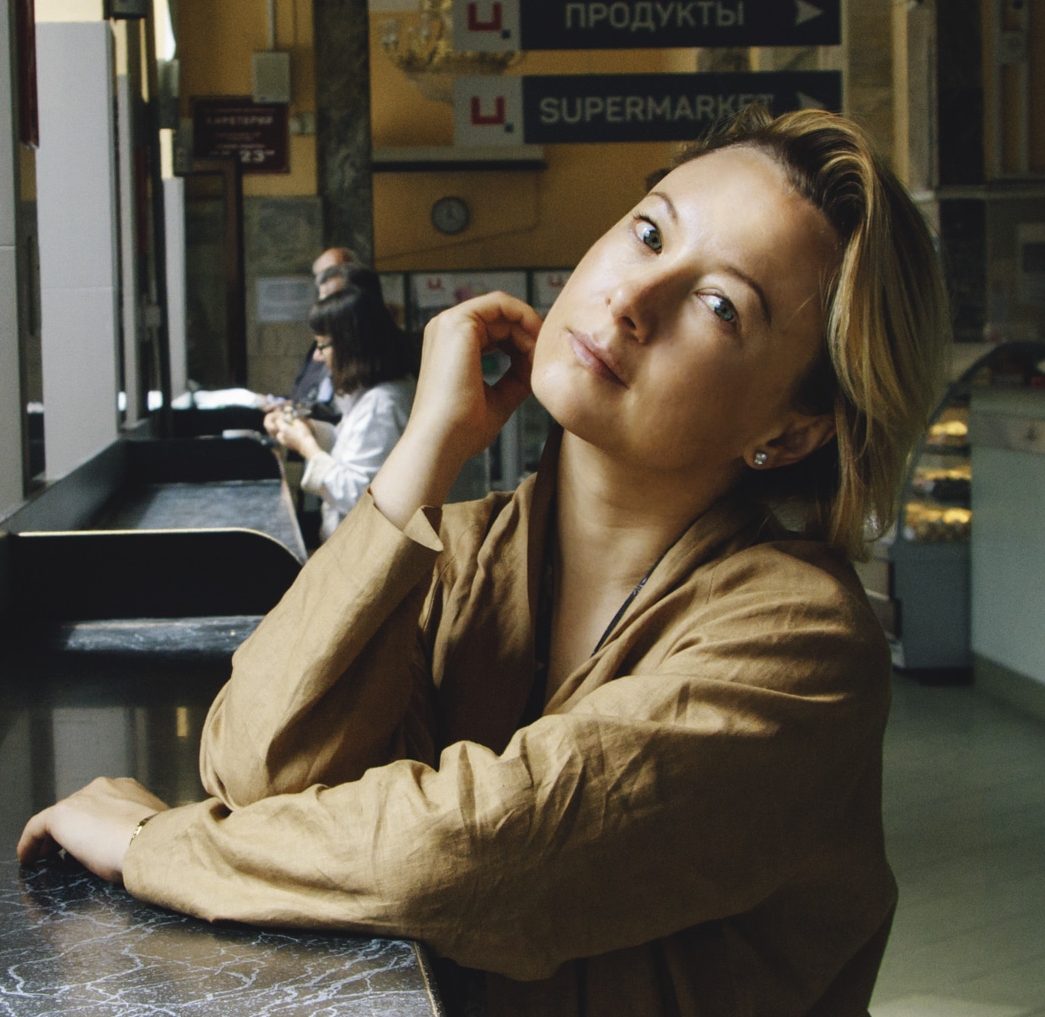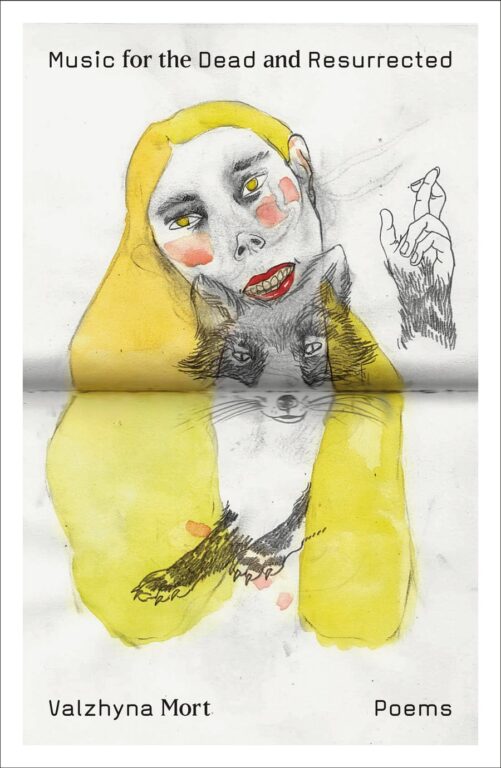
Valzhyna Mort is the author of Factory of Tears and Collected Body. Her work has been honoured with the Lannan Literary Fellowship for Poetry, an Amy Clampitt Residency, the Bess Hokin Prize from Poetry magazine, and the Glenna Luschei Prairie Schooner Award. She is a recipient of the Gulf Coast Prize in Translation and a National Endowment for the Arts grant in translation projects. Born in Minsk, Belarus, she writes in English and Belarusian.

Music for the Dead and Resurrected 2021 International Winner
Judges’ Citation
‘Here, history comes to an end / like a movie / with rolling credits of headstones,’ writes Valzhyna Mort, though the history doesn’t end, but takes deep and memorable residence in the music of these poems.
‘Here, history comes to an end / like a movie / with rolling credits of headstones,’ writes Valzhyna Mort, though the history doesn’t end, but takes deep and memorable residence in the music of these poems. The collection offers many different kinds of poetry: from elegies to protest poems to moments of lyric intimacy. But in all of them there’s an unmistakable emotion embodied in craft, one that continues to echo in our minds long after we finish the book. And this is perhaps the reason why Mort’s striking pages about Belarus are ultimately poems about all of us: they set our remembering and our grief to inimitable music.
Selected poems
by Valzhyna Mort
Not books, but
a street opened my mouth like a doctor’s spatula.
One by one, streets introduced themselves
with the names of national
murderers.
In the State Archives, covers
hardened like scabs
over the ledgers.
*
Inside a tiny apartment
I built myself
into a separate room.
*
Inside a tiny apartment
I built myself
into a separate room,
peopled it
with the Calibans
of plans for the future.
Future that runs on the schedule of public buses,
from the zoo to the circus,
what future;
what is your alibi for these ledgers, these streets, this
apartment, this future?
*
In the purse which held—
through seven wars—
the birth certificates
of the dead, my grandmother
hid—from me—
chocolates. The purse opened like a screaming mouth.
*
The purse opened like a screaming mouth.
Its two shiny buckles watched me
through doors, through walls, through jazz.
Who has taught you to be a frightening face, purse?
I kiss your buckles, I swear myself your subject.
*
August. Apples. I have nobody.
August. For me, a ripe apple is a brother.
For me, a four-legged table is a pet.
*
In the temple of Supermarket
I stand
like a candle
in the line to the priestesses who preserve
the knowledge of sausage prices, the virginity
of milk cartons. My future, small
change.
*
Future that runs on the schedule of public buses.
Streets introduced themselves
with the names
of national murderers. I build myself
into a separate room,
where memory,
the illegal migrant in time, cleans up
after imagination.
*
Bus stops:
My future, an empty seat.
*
In a room where memory strips the beds—
linens that hardened like scabs
on the mattresses—I kiss
little apples—my brothers—I kiss the buckles
that watch us through walls,
through years,
through jazz,
chocolates from a purse that held—through seven wars—
birth certificates of the dead!
Hold me, brother-apple.
Copyright © 2020
Bus Stops: Ars Poetica
I’ve always preferred Cain.
His angry
loneliness, his
lack of his mother’s
love, his Christian
sarcasm: “Am I
my brother’s keeper?”
asks his brother’s murderer.
Aren’t we indeed
the keepers of our dead?
Let me start again:
I prefer apples that roll
far from the tree.
Dry like a twig
is umbilical cord, tucked between legs.
How did they cut it, Cain? With
a stone?
Under Criminal Record
write, “Mother, home.”
Under Weapon
write, “Mother, home.”
Copyright © 2020 by Valzhyna Mort
Genesis
Snow glints and softens
a pig’s slaughter.
Mama refuses another
drink, mama
agrees to another drink.
On the wall—a carpet with peonies,
their purple mouths
suck me into sleep.
Small,
I’ve been bedded.
Toasts
from across the wall,
my lullabies.
Mama says no-no-no
to more drink.
My bed smells of valenky.
Without taking its eyes off me
a cat
licks its gray paw as if sharpening a knife.
Mama yells yes to another drink.
Mama’s breasts are too big to fit into packed morning buses.
There’s uncertainty
I would grow into a real person.
But on a certain day
in Vishnyowka,
a pig
is slaughtered, mama whispers yes
yes yes yes
to more drink,
I’m vanishing into the peonies’ throats,
peonies smell of valenky,
of pig’s blood
on the snow.
Clock’s hands leave a strange ski track.
Copyright © 2020 by Valzhyna Mort, Music for the Dead and Resurrected, Farrar, Straus and Giroux
New Year in Vishnyowka (a lullaby)
allegro for shooing off the police
adagio for washing the body
scherzo for soft laughter and tears
rondo for covering the body with good earth
Antigone, dead siblings
are set.
As for the living —
pick me for a sister.
I, too, love a proper funeral.
Drag, Dig and Sisters’ Pop-Up Burial.
Landlady,
I make the rounds of graves
keeping up
my family’s
top-notch properties.
On a torture instrument
called an accordion
I stretch my bones
into fingers of a witch.
My guts have been emptied
like bellows
for the best sound.
Once we settle your brother,
I’ll show your forests
of the unburied dead.
We’ll clean the way only two sisters
can clean a house:
no bones scattered like dirty socks,
no ashes at the bottom of kneecaps.
Why bicker with husbands about dishes
when we’ve got
mountains of skulls to shine?
Labor and retribution we’ll share, not girlie secrets.
Brought up by dolls and monuments,
I have the bearings
of a horse and bitch,
I’m cement in tears.
You can spot my graves from afar,
marble like newborn skin.
Here, history comes to an end
like a movie
with rolling credits of headstones,
with nameless credits of mass graves.
Every ditch, every hill is suspect.
Pick me for a sister, Antigone.
In this suspicious land
I have a bright shovel of a face.
Copyright © 2021